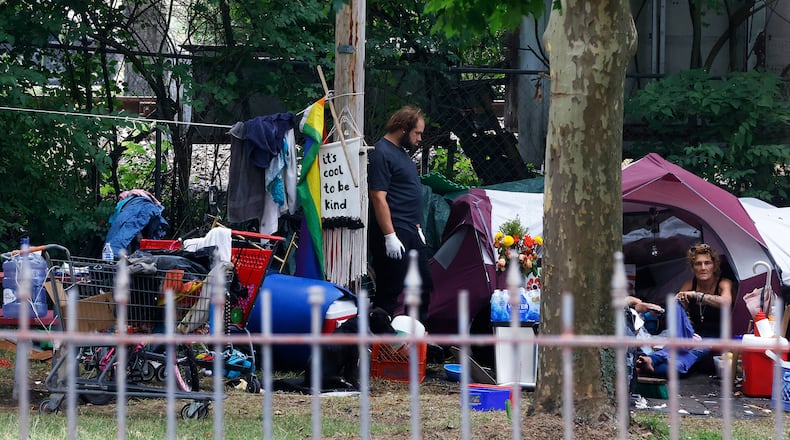“I believe the current approach of encampment sweeps are counterproductive and they have negative impacts on both the individuals experiencing homelessness and the outreach workers that are dedicated in assisting them,” Johna Whitfield, a PATH outreach specialist with Miami Valley Housing Opportunities (MVHO), said at a Dayton City Commission meeting last month.
Dayton City Manager Shelley Dickstein said the city works closely with community partners like MVHO to connect unhoused individuals with resources and services, and that the city’s processes were developed with input from stakeholders and a variety of departments. She said the city is open to making changes if they will better serve these community members.
However, Dickstein also stressed that homelessness is a complex problem, saying the city has a responsibility to all of its constituents, including residents, businesses and property owners who make complaints about health, safety and quality-of-life concerns related to encampments.
“These sweeps that end up happening are because of the amount of complaints typically generated with regards to the encampment,” she said. “We can’t also ignore the fact that this encampment is not legal — they aren’t on property they own or have permission to be there. ... We can’t turn a blind eye to that either."
Homeless encampments
Outreach workers travel all over Montgomery County to try to find people who live in tents, wooded areas, abandoned buildings, vacant garages, automobiles or on the street, Andy Altenburg, PATH outreach specialist with MVHO, said at a city commission meeting last month.
Altenburg said outreach workers try to connect unhoused people with important services and get them on waiting lists for stable housing.
Some people cannot stay in homeless shelters because they have been trespassed from the facilities for behavioral issues or they own pets that are not allowed, Altenburg said.
Some people suffer from severe mental illness and conditions that make it very hard to live in a congregate setting, he said.
Credit: JIM NOELKER
Credit: JIM NOELKER
“If we lose track of them, then they fall off the waiting list for housing and have to start over at some later time,” Altenburg said.
Outreach workers help link unhoused people to medical care, drug recovery programs and mental health treatment, said Leanna Rupp, an outreach worker with MVHO.
Outreach workers say they are spending a lot of time looking for clients who have been displaced by encampment sweeps, which means they have less time to locate and help other unhoused individuals.
“When we lose them, we struggle to maintain continuity of care and that includes monitoring health conditions, medication compliance ... and hinders access to case management, ” Rupp said.
Katherine Rowell, a researcher and professor at Sinclair Community College who spoke at the May 21 city commission meeting, said homelessness is a public health crisis and not a crime. She said the city is not following best practices for dealing with homeless encampments, and she provided the city with a list of some of these strategies.
Rowell said best practices include providing a 30-day notice that an encampment will close, having a team of crisis response workers on hand when a camp is shut down and taking steps to secure people’s belongings. The city of Springfield recently used those practices when closing an encampment in Snyder Park.
“Most people living in encampments have struggled and suffered with many crises,” she said. “Seeing the place where you live plowed over, losing all your belongings is trauma.”
Credit: JIM NOELKER
Credit: JIM NOELKER
Dickstein said city staff will review and evaluate the best practice proposals. She told this newspaper that city staff already take a variety of steps to try help people in encampments before they are cleared.
She said the city’s current policy is to generally provide notice to people living in encampments that they will have to leave about five to seven days ahead of time.
Dickstein has said the city and its partners try to help unhoused individuals relocate to shelters or more appropriate living spaces.
“It’s a balance to do it humanely and supportively,” she said.
But Dickstein also said she doesn’t understand why people experiencing homelessness are being kicked to the back of the waiting line if outreach workers lose touch.
The city manager also said the city cannot ignore complaints it receives about illegal encampments on private and public property. These camps often have problems with bodily waste and trash and other issues, she said.
About the Author




